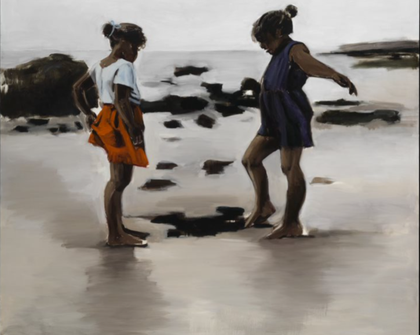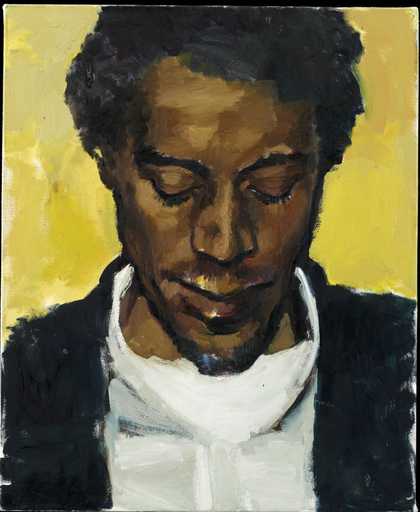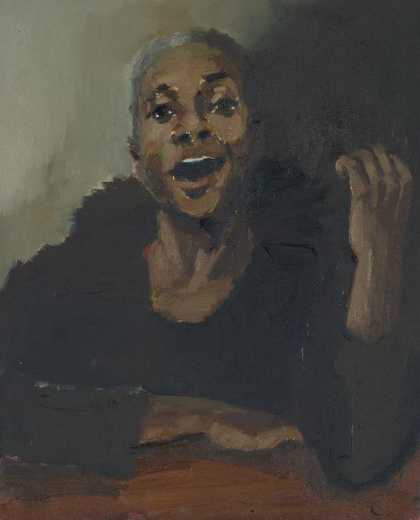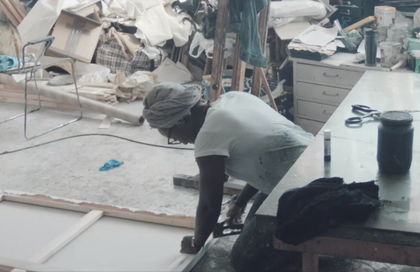Artist Lynette Yiadom-Boakye responds to questions from visitors to her 2022 exhibition at Tate Britain. How does she know when an artwork is finished? What music does she listen to while painting? And has her Ghanaian heritage influenced her work?
Lynette Yiadom-Boakye is a British artist and writer acclaimed for her enigmatic portraits of fictitious people. Both familiar and mysterious, they invite viewers to project their own interpretations, and raise important questions of identity and representation.
It's a very tactile process.
I resolve a lot in the painting as I'm making it and that meant coming up with, I suppose this language of mark making, that's really important to me and the way I see the world. I suppose.
Hi Lynette, I wanted to know why in certain paintings are the figures turning away from the viewer?
I think they don't always want to give you everything.
With hanging this show, one of the things I thought a lot about was where all of the gazes were pointing. There are some rooms where everyone's looking at you. There are some rooms where people are very busy with each other. That's become as important as individual works, is what happens between them.
I wanted to ask how you choose your titles for your artwork?
Titling for me became something like an extra mark. It's part of the work. It's not an explanation of it. So I can never exactly explain the title because it's like explaining a brush mark. It's kind of there because it needs to be.
Texture and layering seem to be incredibly important for you. When do you know when a painting is finished?
Hmm, it varies from work to work. Sometimes I think it's very clear that something's finished. Other times there are things that you can just keep going on and on and on with. Definitely there was a stage when I got better at realizing something was finished. But at the same time my expectations grew. As things get more complex with colour and form and composition, that sense of finished maybe isn't as easily attained as once it was.
Hi Lynette. Thank you for this extraordinary work and this beautiful new show. I wanted to ask you whether the different music that you're listening to at the time how that influences the work that is eventually made?
It has to feel right, it doesn't always feel right. It can be very distracting. The music that I find I can always work to is so specific, well there's two albums, it's almost two albums now. Sketches of Spain, in fact anything by Miles Davis I can listen to. Bill Evans I can listen to.
Sketches of Spain is an interesting one because I can almost see it in certain paintings. There are a lot of paintings made to that album, so I know it's one that will focus me and silences everything in your head.
When you're drawing from memory, how is it that the features are so defined? What is that line between memory and imagined?
The way that memory works for me is it can be the catalyst, the start of something, something I've witnessed, a look I've seen, an expression, a moment, but then I have to research that. So the sources I work from are scrapbooks, with lots of images I've collected, drawings, photographs. I'm not pulling things out of the air. I'm just not that, not that good.
I wanted to ask you if your Ghanaian heritage plays an important role in your works?
Yes, yes it does. So much as my way of thinking is very much informed by who raised me, how I was raised, where I was raised. So it's integral but it's not something that I would break down and be able to say, well this is influenced by that, this is influenced by Ghana, this is influenced by London. It's really to do with a life lived.
Lynette have you ever felt the need to make your art in response to racial politics?
In response to, not really. What I've always said is it's in the work and it's up to everyone to see that. It's not something that I'm interested in prescribing or describing. I've never distinguished my politics from my life. It's in the fabric of what I'm doing. I make the work that I want to make, regardless of who has made it their life's work to hate me. That's a ridiculous starting point to have for a career or for a practice.
What would you say to a young person thinking about going into the creative industry? What was your journey and your experience of becoming an artist?
Every single journey is completely different. The problem arises when you try to emulate someone else's journey. I would say think less about my career as artist, think less about my brand and think about what you want to do. Ultimately it has to come from you. You need to get used to talking to yourself and gaining more of an understanding of what it is you're actually trying to do or wanting to do.
Lynette it means such a lot to us to be able to bring this exhibition back to London and I wondered if there's one painting in the exhibition that means the most to you?
The very last one has a special place in my heart, The Stygian Silk. It seemed to encapsulate and capture many feelings that I had. It's this really sodden, inky, kind of crude oil black that I've been trying to get for years. It evolved out of another work that didn't, didn't work out and so it became this exercise in going back and forth with this black and blue, and black and blue.
I can still remember having that feeling of 'yeah! Got it!' Because it doesn't happen often but there are moments when you're like 'that's exactly what it should be'.




